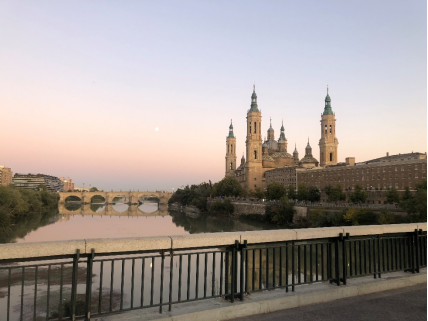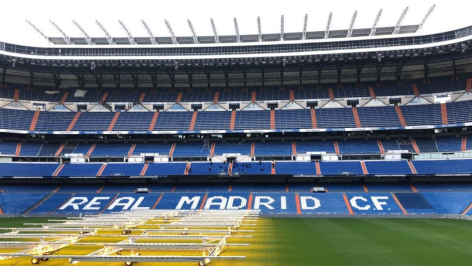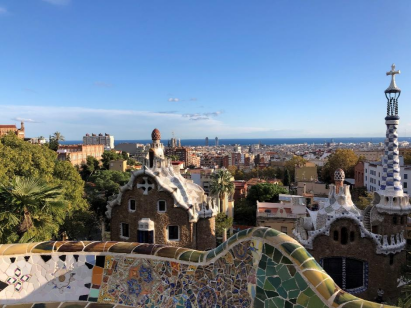LI Yanhan
The news that I had been chosen as an exchange student to attend the University of Zaragoza and major in Nanostructured Materials for Nanotechnology Application in June 2019 made me pleased. With time passing, in mid-September, I packed my luggage and traveled halfway around the world to Zaragoza with a mix of optimism and dread. My “one-year” journey to Spain had begun.
I would like to talk about this experience from two aspects: study and daily life.
Studying at the University of Zaragoza
The class had 25 students, with nearly half of them being Spanish. The remainder were international students from different parts of the world, including gifted females who have already obtained degrees from several universities, professional dancers who had performed in theater, straight-A students, and upbeat individuals who are good at bringing a smile to people’s faces. Because there were only two Chinese students in the class at the beginning, we were unsure how to connect with our classmates. However, thanks to our classmates’ “ni hao (hello)”, we soon became friends. Every one of my classmates got along nicely throughout the eight months. When we encountered challenges in our schoolwork or personal lives, others could always be the ones to help.
The teachers who taught us were all Spanish and are very kind and welcoming. Probably out of concern for us two Chinese students, the teachers would slow down their lectures. However, because most of them had strong accents, it did take some time to get used to the accents.
Courses
In Spain, a master’s degree can be earned by finishing both the coursework and a Final Master Project (FMP, equivalent to an undergraduate thesis).
Taking my major as an example, I studied seven modules this academic year, five compulsory modules, and two optional modules. Each module had about ten courses, but there was no need to be anxious and stressed because each course was only taken two or three times. All these curricula required for students were quite comprehensive, covering basic material courses, material preparation, characterization, application, and production. The assessment of each module was evaluated by ongoing assessment (assignments, quizzes, lab reports, etc., for each course), exam (open-book exam, a computer without internet access is available), and seminar (papers for modules plus a PPT oral presentation delivered by groups). The passing score was 5 out of a possible 10, so I believe there are no particular situations or issues with failing for our NanjingTech students.

Seven Modules by the University of Zaragoza
The majority of the student’s FMP would be completed in the following semester. Due to COVID-19, I could only complete the synthesis of materials in my FMP rather than the experimental part. Under special circumstances, the University of Zaragoza would consent to adjust the structure of the thesis to a review. In Spain, the lab management system is more strict. All students must complete three significant lab safety training sessions and pass an exam before they are allowed to enter the lab to begin FPM. Moreover, students are not under much pressure as long as they go to the lab on time and meet the workload because FMP is usually supervised by a supervisor or a doctor who is committed to their duties.

Lunch Break

the Lab
Academic Experiences
Whether the exchange program is worthwhile or not is a very personal issue, which can be viewed quite differently depending on the perspective, degree, and domain from which the issue is being approached. During the time I was at the University of Zaragoza, I had both gains and losses. Since I was a Ph.D. student and could not attend any domestic classes during the year, I was unable to complete my experiments and my research was interrupted. As a result, I had no grades and could only receive the lowest grade possible for my scholarship the following year, which was indeed a big impact. But the gains of this year are not negligible.
First of all, as a line from the Analects of Confucius goes, “A craftsman who wishes to do his work well must first sharpen his tools.” A solid theoretical foundation can improve the efficiency of future studies and research. Since I worked with my Spanish students, I just got to understand this. It was a seminar in which we were required to make and orally present a review presentation of drug carriers, and my classmates and I were responsible for the different slides of the presentation. Unlike my classmate, who read through all the literature and clarified it before starting making the slides, I did not have a vague idea in my mind until the presentation file was finished because I had just pasted the papers I had read. It seemed that I made the slides faster than him, but what about the knowledge we learned through the process? Numerous students might experience the same issue when recalling our entire master’s degree period. When we are given a topic, we simply read the articles in this single area to discover how other researchers have prepared and characterized it. In fact, at this time, to return to the very very beginning, to cement the theoretical foundation, is not unnecessary for research innovation.
Secondly, the curriculum arranged by the University of Zaragoza is comprehensive, including physics, chemistry, and biology, and the assessment is relatively rigorous, which can bring new ideas for research while learning more from the courses. Such an arrangement will make it easier for students to nurture a perspective of the overall situation with pool wisdom and insights for research and multi-disciplinary development.
Finally, the university’s language environment has greatly enhanced my English. I was compelled to speak English because my classmates and teachers were all foreigners. Thanks to the outside pressure, I changed a lot, from being afraid to speak English at the beginning to being comfortable in conversation with other English speakers later on. In the Seminar of each module, I had to discuss with my group members and present on stage, which also improved my collaboration skills and confidence to a certain extent.
Daily Life
Zaragoza is a very nice city. It is the fifth largest city in Spain, where Chinese students are more populous than we expected. Zaragoza has a semi-arid climate, as it lies in a wide basin entirely surrounded by mountains which block off moist air from the Atlantic and Mediterranean. The transportation here is convenient, and there are many Chinese stores and Chinese restaurants, which gives a heart-warming feeling.
As for the cost that everyone is concerned about, if you find someone to share a room, you can rent a very good house for 300 Euros/person/month, and the monthly per capita water, electricity, coal and internet will add up to about 50 Euros. Adding all the money spent to live and eat here together, 1000 Euros per month is enough.
Plenty of sunshine makes people here learn to live in the moment. Sports, food, and parties are all part of life. Spain has many festivals (holidays) that I can’t name and the local people have many ways to celebrate them. Although Zaragoza is not that big, it is a high-end international city. I have enjoyed the pleasure of meeting and making friends from other countries, learning to understand and tolerate in the face of cultural differences.

Fiestas del Pila

Carnival

Catedral-Basílica de Nuestra Señora del Pilar

Parque del Buen Retiro

Estadio Santiago Bernabéu

Sagrada Família

Park Güell